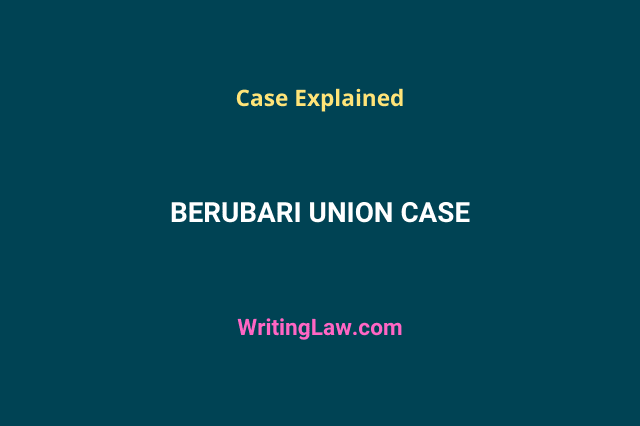
The Berubari Union and Exchange of Enclaves
[AIR 1960 SC 845]
Introduction
In the case of the Berubari Union, the President had consulted the Supreme Court of India regarding the Nehru-Noon Agreement signed between the Prime Minister of India and Pakistan.
The dispute was that the State Government of West Bengal did not want to give any territory of Berubari to Pakistan. The Central Government signed the Nehru-Noon Agreement, which clearly states that the territory of Berubari will be equally distributed between India and Pakistan. Therefore, this matter was finally taken to the Supreme Court of India.
The points made in the Berubari case were repeated in the Kesavananda Bharati decision and provided clarity.
The judgment also mentioned that the Preamble of the Constitution serves as a guide to open the minds of the framers of law. But, the preamble is not the source of all the powers given to the government by the Constitution of India.
Facts of In re Berubari Case
After the enactment of the Mountbatten Plan of 1947, known as the Independence Act, it was said that, in the two-nation theory, India would be divided into two separate territories – Pakistan and India.
Now, the problem was what would be given to India, and the exact problem arose with Pakistan. Therefore, the map for the same was not finalised on that day. A surveyor named Sir Cyril John Radcliffe was called and given the responsibility to divide the area of India and Pakistan in the next five weeks.
Even Radcliffe was pretty confused, so he applied the principle of majoritarianism and divided the areas according to the majority population living in that area. For example, the regions with a majority Muslim population were given to Pakistan, and the areas containing the Hindu population were given to India.
There was a region called Berubari in Jalpaiguri district in West Bengal, and Radcliff gave this region to India, but unfortunately, he forgot to mention it in his written map. Due to this reason, Pakistan took advantage of the situation and started claiming Berubari, and because of this particular reason, a dispute arose between India and Pakistan.
To solve this issue, the Nehru-Noon Agreement was introduced in 1958. By way of this agreement, it was decided that the Berubari region would be equally divided between India and Pakistan. However, the President took the matter under Article 143 of the Indian Constitution, and he consulted the case with the Supreme Court.
Important Provisions
- Article 1(3)(c) of the Indian Constitution states that Indians can acquire foreign territory.
- Article 3 of the Indian Constitution gives power to the parliament to increase, decrease or alter the boundary of any state. The parliament can even change the name of any state.
- Article 368 of the Indian Constitution provides power to the parliament to amend the Constitution and its procedures as the rules laid down in this Article.
Must Read: Amendment in the Indian Constitution – Procedure, Modes, and Types
Issues Raised in the In re Berubari Case
- Whether the parliament has the power to grant any territory of the state to a foreign country under Article 3 of the Indian Constitution?
- Whether legislative action is necessary for the implementation of the Nehru-Noon Agreement?
Arguments Given by the Government
The government said that we are not doing cession of any land. Instead, we are just exchanging the land, so no legislative intervention is required.
Arguments Given by the Exchange of Enclaves
According to the Preamble, the parliament does not have any power to make any changes in the country’s territory. Moreover, Article 1(3)(c) mentions that the parliament can acquire territories but cannot give any territory to a foreign country.
Judgement Given by the Court in the Berubari Union Case
The Supreme Court held that the parliament does not have the power to give the territory of any state to another country under Article 3 of the Indian Constitution. Parliament can do so only after amending Article 368 of the Indian Constitution.
The Supreme Court further concluded that the Preamble is not a part of the Indian Constitution. Moreover, Article 1(3)(c) only talks about acquiring territories and not ceding any territory.
However, Article 368 gives the power to amend the Constitution, and parliament can also amend Article 1 of the Constitution but only after bringing an amendment in Article 368. Only then the land can be ceded to East Pakistan. This means that the Nehru-Noon Agreement is subjected to the approval of both the houses of parliament. Any territory of India can be ceded to a foreign country only after amending Article 1 with the special majority of parliament.
Impact of the Berubari Union Judgement
The parliament had to bring the 9th Amendment Act in 1960 that amended Schedule 1 of the Indian Constitution. The Nehru-Noon Agreement was finally implemented and transferred the Berubari union to Pakistan.
Read Next:
1. 5 Ways of Acquiring Citizenship of India
2. 10 Reasons Why Centre Is Powerful Than the States!
- 13 Characteristics of a Company Under the Companies Act - 5th March 2024
- Lee vs Lee’s Air Farming Ltd – Case Explained - 5th March 2024
- Relevant Facts Under the Indian Evidence Act - 14th January 2024







